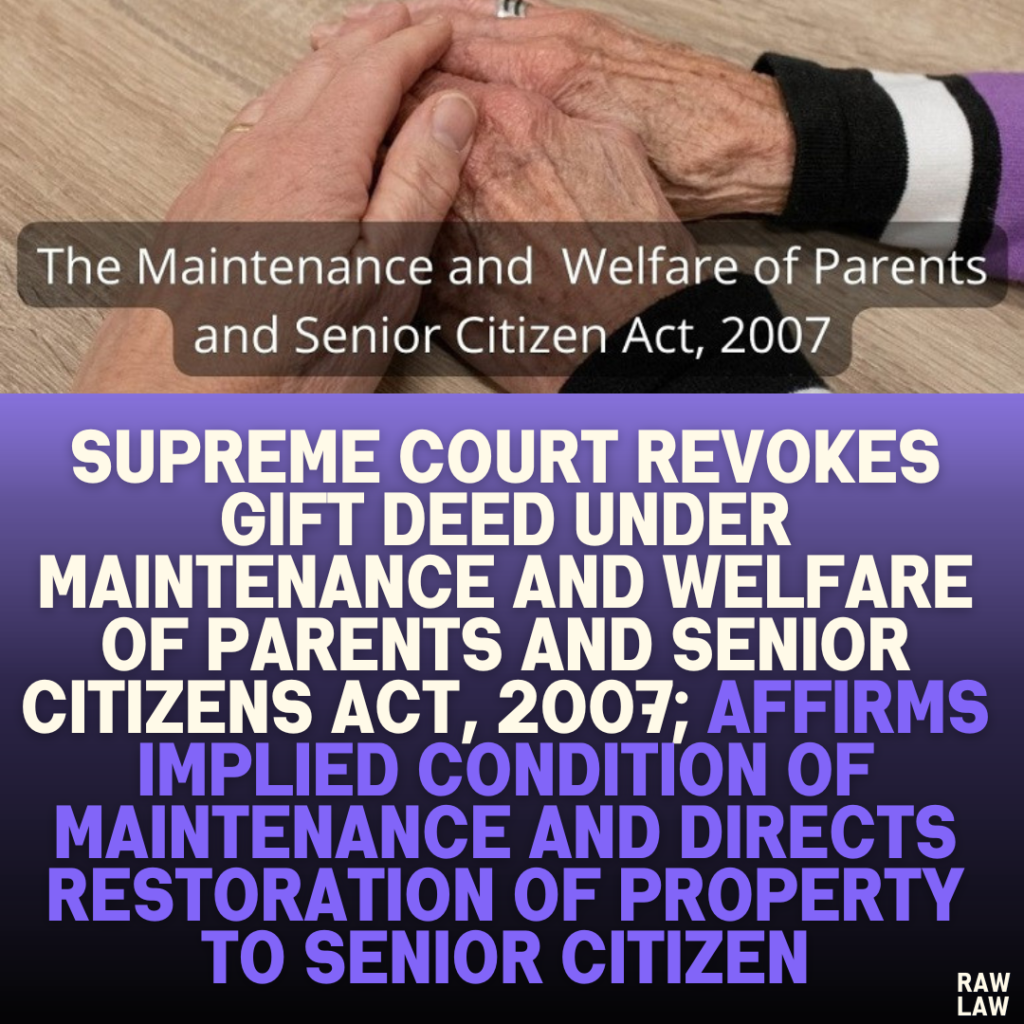Court’s Decision
The Supreme Court reversed the High Court of Madhya Pradesh’s Division Bench ruling, which had set aside orders by lower courts canceling a Gift Deed executed by the appellant (a senior citizen) in favor of her son (the respondent). The Court held that the Gift Deed was subject to an implied condition of maintenance under Section 23 of the Maintenance and Welfare of Parents and Senior Citizens Act, 2007. Since the condition was violated, the deed was rightly revoked. The Supreme Court ordered that the property be restored to the appellant by February 28, 2025.
Facts
- Property Details: The appellant, a senior citizen, had purchased the property in 1968.
- Gift Deed Execution: On September 7, 2019, the appellant executed a Gift Deed transferring the property to her son, which was registered on September 9, 2019. The deed implied that the son would provide maintenance and care.
- Promissory Note: A supplementary “vachan patra” (promissory note) was signed by the respondent, agreeing to take care of the appellant and her husband. It stipulated that the Gift Deed could be revoked if he failed in his obligations. The respondent disputed the authenticity of this note.
- Allegations and Application: In December 2020, the appellant filed a petition under Sections 22 and 23 of the Act, alleging neglect, mistreatment, and physical violence from the respondent. She sought the cancellation of the Gift Deed, claiming the respondent failed to fulfill his maintenance obligations.
Issues
- Did the High Court err in overturning the cancellation of the Gift Deed by the lower courts?
- Can the Gift Deed be revoked under Section 23 of the Act if the transferee fails to fulfill maintenance obligations?
Petitioner’s Arguments
- The Gift Deed and promissory note collectively imposed maintenance obligations on the respondent.
- The respondent’s failure to meet these obligations, coupled with allegations of neglect and abuse, justified the revocation of the deed under Section 23 of the Act.
Respondent’s Arguments
- The respondent claimed that the Gift Deed was unconditional and did not impose any obligation for maintenance.
- The respondent challenged the validity of the promissory note, arguing it was fabricated and unenforceable.
Analysis of the Law
- Section 23 of the Act: This provision deems property transfers void if a senior citizen makes a conditional transfer based on maintenance, and the transferee fails to meet those conditions.
- Subsection (1) explicitly voids such transfers if conditions for basic amenities are violated.
- Subsection (3) allows third parties to act on behalf of the senior citizen if they cannot enforce their rights.
- Interpretation of Beneficial Legislation:
- Citing judgments such as Sudesh Chhikara v. Ramti Devi, the Court emphasized that beneficial legislation must be interpreted to fulfill its purpose.
- The Supreme Court reiterated that conditions for maintenance, even if implied, must be given effect to safeguard senior citizens.
- Tribunal’s Powers: Referring to S. Vanitha v. Deputy Commissioner, the Court clarified that tribunals constituted under the Act have the authority to order the restoration of possession when necessary to ensure the welfare of senior citizens.
Precedent Analysis
- Sudesh Chhikara v. Ramti Devi (2022):
- This case outlined two prerequisites for invoking Section 23:
- The transfer must be conditional on maintenance.
- The transferee must fail to provide maintenance.
- The Court ruled that both elements were satisfied in this case.
- This case outlined two prerequisites for invoking Section 23:
- S. Vanitha v. Deputy Commissioner (2021):
- The Supreme Court recognized the tribunal’s authority to order possession transfer to ensure the rights of senior citizens.
- This judgment reinforced the Act’s objective of providing effective remedies for the elderly.
Court’s Reasoning
- Implied Maintenance Obligations: The Court noted that the Gift Deed and promissory note collectively established the respondent’s duty to provide maintenance.
- Failure of Obligations: The Court found that the respondent failed to fulfill his duties, justifying the cancellation of the Gift Deed under Section 23.
- Beneficial Interpretation: The Court criticized the High Court’s Division Bench for adopting a strict interpretation of Section 23, which was contrary to the Act’s intent. It held that a liberal, purposive approach was necessary to protect senior citizens.
- Tribunal’s Authority: The Court affirmed that tribunals could order the restoration of possession to senior citizens as part of their powers under the Act.
Conclusion
The Supreme Court set aside the High Court’s Division Bench ruling, reinstating the orders of the lower courts. It quashed the Gift Deed and directed the restoration of possession to the appellant by February 28, 2025. The Court also directed state authorities to ensure compliance with its order.
Implications
- Strengthening Senior Citizen Protections: This judgment underscores the importance of safeguarding the rights of senior citizens under the Act.
- Expanding Tribunal Powers: It affirms the authority of tribunals to not only cancel property transfers but also enforce possession.
- Liberal Interpretation of Beneficial Legislation: The decision reaffirms that courts must adopt a purposive interpretation to further the objectives of beneficial statutes.
